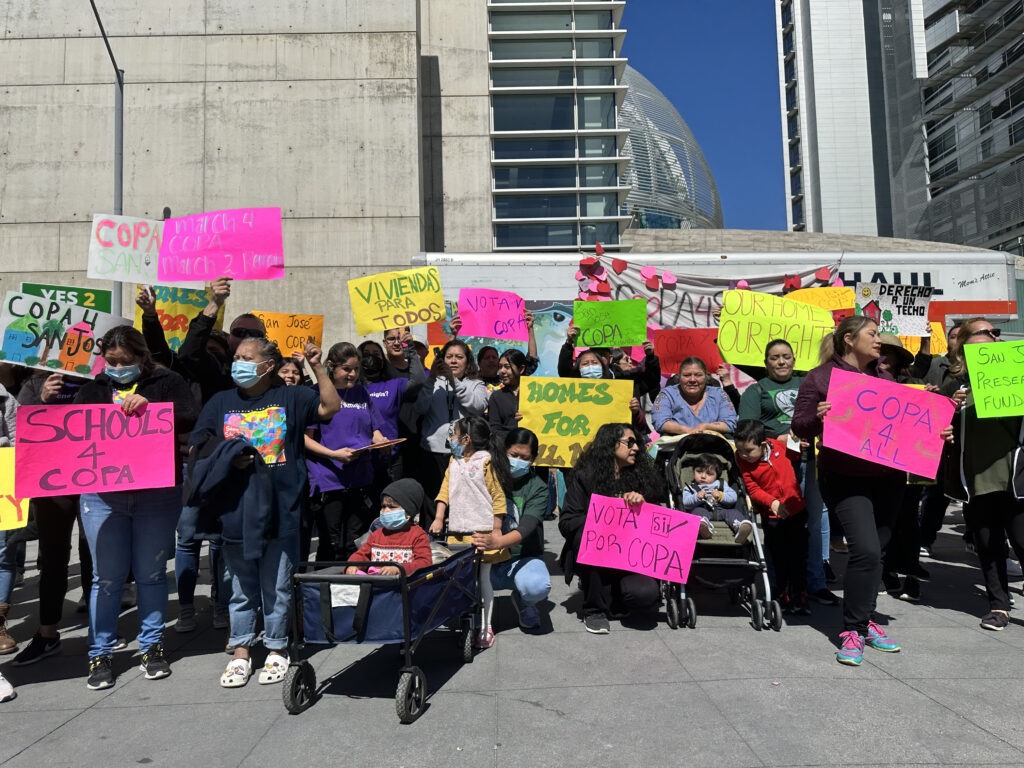More than 100 residents stood in front of San Jose City Hall with empty moving boxes and suitcases in hand on Monday to represent the increasing displacement rates in the city, as housing and cost of living prices remain high.
About 20 nonprofits, including SOMOS Mayfair and the South Bay Progressive Alliance, organized the rally in front of City Hall to pressure councilmembers to support the Community Opportunity to Purchase Act, or COPA, ahead of a vote by the Community and Economic Development Committee. The policy gives qualified nonprofits the ability to make the first offer on multi-family residential properties in San Jose. These nonprofits would then be able to rent at affordable rates to help residents stay in their homes.
The committee voted 3-2 to reject the policy because opposing Councilmembers Arjun Batra and Pam Foley, along with Vice Mayor Rosemary Kamei, believe COPA would not effectively use taxpayer dollars to maximize affordable housing preservation. However, the committee’s vote acts as a recommendation and does not have lasting policy impacts. COPA will still come before the full City Council for an official vote on April 25.
“We need COPA now. We need an anti-displacement policy now. We can’t afford to wait anymore,” rally organizer Maria Guerrero told San José Spotlight. “The community is being displaced every day to different cities, different states. We need something for them to be able to stay now.”


Guerrero said COPA is a necessary policy that would allow San Jose to preserve existing units as affordable instead of waiting years to build new ones. The rally also featured a skit, along with heartfelt testimonies from San Jose residents on the brink of displacement.
San Jose resident Nkechi Franklin said she’s been a victim of several evictions and that every time she has to move out, it puts her further behind.
“We’re constantly being knocked down, constantly being forgotten,” Franklin said. “This is why COPA is so important. COPA will help preserve affordable housing. And we need housing in order to stabilize our families and deal with everyday life.”
Dozens of folks at #SanJose City Hall rallying in support of COPA.
The affordable housing policy, which would give nonprofits first bid to purchase multi-family homes, is set to come to council in a month.
Story TK @SJSpotlight pic.twitter.com/WcODrJty4d
— Jana Kadah (@Jana_Kadah) March 27, 2023
The city council first studied COPA in 2020 and faced several delays before bringing it back to councilmembers. Several cities have adopted similar policies, including Washington D.C. and San Francisco. Assemblymember Ash Kalra also introduced a state version of COPA last month.
Proponents said COPA would allow nonprofits and the city to leverage state and federal preservation dollars to purchase housing, help people stay in their homes and increase the city’s supply of affordable housing.
However, opponents believe the policy would give too much power to nonprofits and affect a property owner’s ability to market their home—and they’re putting pressure on the council. In addition to several letters from the public, influential political organizations have lobbied councilmembers to vote against the policy. Since the start of this year, Anil Babbar from the California Apartment Association has met with Councilmembers Arjun Batra, Pam Foley and Bien Doan, along with Vice Mayor Rosemary Kamei, about opposing COPA, lobbying reports show.
Babbar, senior vice president of public affairs for the California Apartment Association, said COPA is a misguided attempt to regulate the sale of rental housing without solving the crux of the problem.
“COPA is a lazy way for the city to pretend it is meeting its affordable housing goals,” Babbar told San José Spotlight. “If the city was serious about wanting to ensure the preservation of naturally occurring affordable homes, they would release funding to the nonprofit buyers, enlist the services of a real estate broker and start making offers today. This can all be done without this ordinance.”
Contact Jana Kadah at [email protected] or @Jana_Kadah on Twitter.



Leave a Reply
You must be logged in to post a comment.